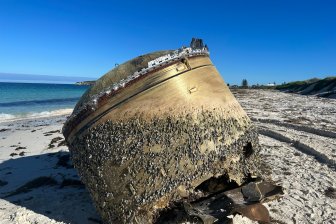Titan implosion an ‘extreme outlier’ in deep-sea exploration, says Cameron – National | Globalnews.ca
Acclaimed Titanic film director and deep-sea explorer James Cameron says passenger submersibles should be more regulated following the OceanGate Titan disaster.
He says the exploration sector where he works has a proven track record of safely operating due to rigorous safety and testing standards, and those need to be upheld.
“I think there should be very specific regulations around treating any kind of passenger vehicle, which (Titan) was, … the same way that you would (treat) a ship that takes passengers,” Cameron said.

Cameron and his exploration mentor Joseph MacInnis were in Ottawa for a presentation on Cameron’s famed submersible the Deepsea Challenger, which is on exhibition at the Royal Canadian Geographic Society.
The Deepsea Challenger went through seven years of intensive testing, including pressure and disaster response training, prior to making manned deep-sea voyages.
Cameron said that as a filmmaker he could imagine all sorts of things to go wrong, including implosion, and reverse-engineered the vessel from there.
“We have over a half-century of a perfect safety record in the deep submergence community, actual exploration and actual research,” Cameron said.
“Even in tourist diving, we have millions of human hours inside subs, in tourist subs all over the world right now. No fatalities, no incidents, no deaths, no implosions, until today. This is an extreme outlier of a data point.”
The OceanGate Titan was carrying a tourist crew on a voyage to the Titanic wreckage last month when it lost contact with its Canadian-flagged launch vessel, the Polar Prince, about one hour and 45 minutes after beginning its descent.
This launched a five-day international search and rescue operation that ultimately found a debris field – the Titan most likely imploded around the time it lost contact, killing all five people on board including OceanGate CEO Stockton Rush.

Maritime lawyer William Sharpe of Route Law in Toronto says regulating submersibles is complicated.
“Regulating submersibles is a grey area because they’re carried on board the ships and then deployed when the ship is above a wreck or an oilfield to do commercial inspections or exploration or excursions,” he said.
Sharpe explains that ocean-faring ships, like the Polar Prince, are flagged with their country of origin. This means they are subject to that country’s maritime and international laws.
However, submersibles like Titan don’t have the same requirement.
“The more direct way (to regulate submersibles) would be to have national or international rules saying that all submersibles used for a commercial purpose have to be flagged,” Sharpe said.
“Flagging the ship means it is subject to the power of international law or national laws. But the flag states still have to pass laws establishing technical and operating standards for submersibles.”
The Polar Prince left a St. John’s, N.L., port on June 16, and the Titan began its descent into international waters on June 18.
The Transportation Safety Board (TSB) launched an investigation in the wake of the incident.
In their last update on June 28, the TSB says they are finished collecting relevant documents and conducting preliminary interviews with people on board the Polar Prince. The vessel’s voyage data recorder is being analyzed at the TSB Engineering Laboratory in Ottawa.
Forty-one people were aboard the Polar Prince at the time of the incident including members of the deceased’s families.

A representative from the TSB says they don’t have any more information to share at this time as the investigation is still ongoing.
In a statement, a spokesperson from Transport Canada says it would be premature to talk about any regulatory changes or potential work at the International Maritime Organization with the TSB investigation currently in progress.
Transport Canada adds that if an operator registers a submersible in Canada it would be under their oversight. That regulation would then depend on the submersible’s size and how many passengers it carries.
OceanGate is an American company and OceanGate Expeditions, the subsidiary company that led Titan dives, is registered in the Bahamas.
Since the disaster, OceanGate suspended all commercial and exploration operations.
The Titan wreckage that was recovered has been documented by the TSB as part of their investigation and is currently in possession of the United States Coast Guard.
– with files from Global News’ Aaron D’Andrea, The Canadian Press, and The Associated Press
© 2023 Global News, a division of Corus Entertainment Inc.
For all the latest Technology News Click Here




